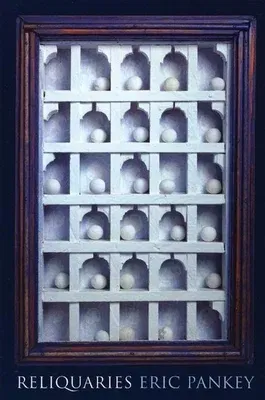Originally drafted over a six-month period, the five-line sections of
each poem in Reliquaries were written mostly as walking meditations in
the hills and woods above and along the banks of the Occoquan River in
Virginia. While that landscape is present in several places in the
collection, the mind in these poems wanders arctic zones, England,
Europe, the distances and openness of the American Midwest where the
poet grew up, and takes up subjects such as the death of family and
friends, faith and doubt, beauty and the sublime, philosophy and art.
This book is Pankey's most expansive, accessible and wide-ranging to
date. Written in long lines that, like Whitman's, catalog and collect,
arrange out of the scattershot an order--even if only a momentary order,
even if only a relic of order on which one places faith in a greater
unifying order.
Completed on a John Simon Guggenheim Memorial Foundation Fellowship at
the same time as 2003's Oracle Figures (Ausable Press), Reliquaries
is a cousin and companion to that book. It is a book-length sequence of
poems that combines the spiritual and sometimes hermetic quest of
Pankey's short lyric poems of the 1990s (Apocrypha, The Late
Romances and Cenotaph) with his more directly narrative, plain-spoken
poems of the 1980s (For the New Year, Heartwood). Like a reliquary,
each poem not only holds shards of memory, relics of the past, but each
poem is a meditation upon the complexity of memory--its uncertainty and
mutability, its precision and candor, its grave density and its
ether-weight.
Eric Pankey has received the Walt Whitman Award from The Academy of
American Poets, the Poetry Award from the Library of Virginia and
fellowships from the Ingram Merrill Foundation, the National Endowment
for the Arts and the John Simon Guggenheim Memorial Foundation. A
professor of English at George Mason University, he lives in Fairfax,
Virginia.

